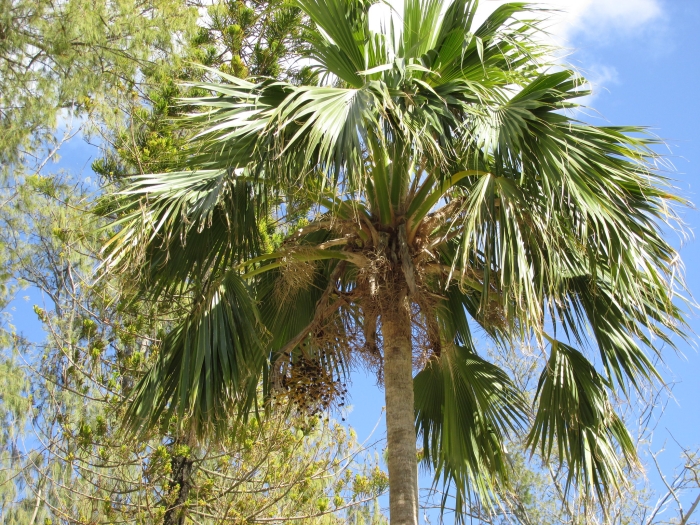Molokai Fan Palm
(Pritchardia hillebrandii)
Molokai Fan Palm (Pritchardia hillebrandii)
/
/

Forest and Kim Starr
CC BY 2.0
Image By:
Forest and Kim Starr
Recorded By:
Copyright:
CC BY 2.0
Copyright Notice:
Photo by: Forest and Kim Starr | License Type: CC BY 2.0 | License URL: https://creativecommons.org/licenses/by/2.0/ | Uploader: Starr Environmental | Publisher: Flickr |





















Estimated Native Range
Summary
Pritchardia hillebrandii, commonly known as Molokai fan palm, is an evergreen tree endemic to the moist and dry forests of the Hawaiian Islands, particularly on Molokai, Maui, and Lanai. It typically grows to a height of 15-20 feet (5-6 meters) and a width of up to 10 feet (3 meters). The palm has a single, slender trunk and large, fan-shaped leaves that can be several feet wide. The yellow flowers, which appear in the winter and spring, are followed by small black fruits that are eaten by native birds.
The Molokai fan palm is valued for its tropical appearance and is often used in landscaping for its aesthetic appeal. It is suitable for urban settings, private gardens, and as a focal point in a landscape design. This palm is relatively low maintenance but requires protection from strong winds. It thrives in well-draining soils and benefits from regular watering, especially during dry periods. While it can tolerate a range of light conditions, it does best in part shade. There are no major disease problems, but it can be susceptible to spider mites and scale insects if grown in dry, dusty conditions.CC BY-SA 4.0
The Molokai fan palm is valued for its tropical appearance and is often used in landscaping for its aesthetic appeal. It is suitable for urban settings, private gardens, and as a focal point in a landscape design. This palm is relatively low maintenance but requires protection from strong winds. It thrives in well-draining soils and benefits from regular watering, especially during dry periods. While it can tolerate a range of light conditions, it does best in part shade. There are no major disease problems, but it can be susceptible to spider mites and scale insects if grown in dry, dusty conditions.CC BY-SA 4.0
Plant Description
- Plant Type: Tree
- Height: 15-20 feet
- Width: 10-10 feet
- Growth Rate: Slow
- Flower Color: Yellow
- Flowering Season: Spring, Winter
- Leaf Retention: Evergreen
Growth Requirements
- Sun: Part Shade
- Water: Medium, High
- Drainage: Fast, Medium
Common Uses
Low Maintenance, Potted Plant
Natural Habitat
Moist and dry forests of the Hawaiian Islands, particularly on Molokai, Maui, and Lanai
Other Names
Common Names: Lo’ulu Lelo , Sandalwood
Scientific Names: Pritchardia hillebrandii , Pritchardia insignis , Eupritchardia hillebrandtii , Styloma hillebrandii , Styloma insignis , Washingtonia hildebrandtii , Washingtonia hillebrandii
GBIF Accepted Name: Pritchardia hillebrandii Becc.